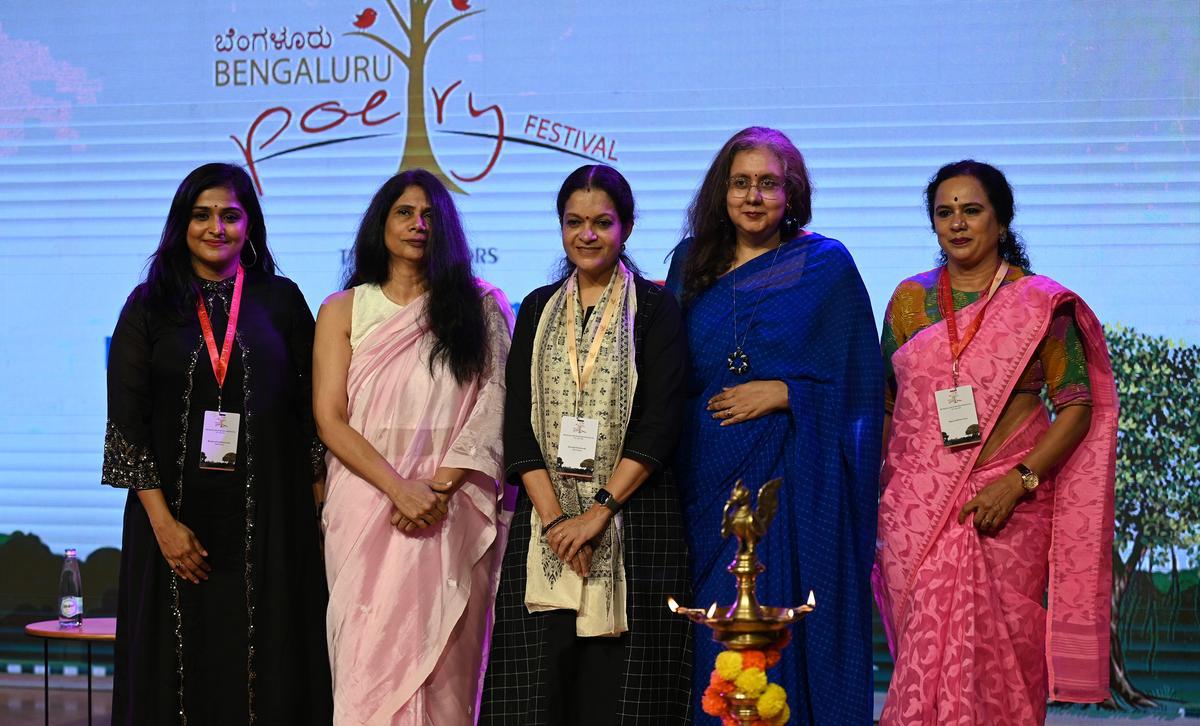 Image Source: The Hindu
Image Source: The Hindu
The vibrant city of Bengaluru welcomed poetry lovers from across India and beyond as the Bengaluru Poetry Festival 2025 unfurled its ninth edition on August 2 at Indiranagar Sangeetha Sabha. Day 1 brought a profound blend of nostalgia, melody, and political consciousness, highlighted by a tribute to the iconic Kishore Kumar and moving sessions echoing the ongoing crisis in Gaza.
Key Highlights and Day 1 Features
The festival kicked off with an official inauguration that set an inclusive and celebratory tone, attended by a full house of over 5,000 poetry aficionados.
The opening morning featured a diverse line-up of established and emerging poets, lyricists, musicians, and performers from India and across the globe.
Heritage and innovation were interwoven, as sessions were held in multiple languages—including Hindi, Kannada, Tamil, English, and for the first time, Gujarati, Punjabi, and Dogri.
Tribute to Kishore Kumar: Dil Aaj Shayar Hai
A centerpiece event of Day 1 was the musical-poetic performance Dil Aaj Shayar Hai—Remembering Kishore Kumar. In this immersive session, poets, singers, and lyricists journeyed through the magic of Kishore Kumar’s film songs and poetry.
The performance combined live renditions, anecdotes, and poetic reflections on the singer’s unique ability to blend melody with verse, bringing alive memories and inspiring discussions on the place of song lyrics in contemporary poetry.
Filmmaker Rakeysh Omprakash Mehra and music historian Balaji Vittal were among those who shared insights on Kishore Kumar, further deepening the engagement with his legacy.
Poetry in a Time of Conflict: Voices on Gaza
Taking a powerful turn, the afternoon included a multilingual session focusing on the poetry of resistance and solidarity with Gaza. This segment showcased poets who recited original works and translated poetry from Gaza-based writers, reflecting on the realities of war, loss, and resilience.
Discussions centered on the role of poetry in bearing witness, offering hope, and mobilizing empathy for those caught in global conflict zones, making it one of the most emotionally resonant parts of the day.
Diverse Performers and Global Reach
Day 1 also saw performances by internationally recognized poets Gagan Gill, Swanand Kirkire, Jeet Thayil, and Sahitya Akademi Yuva Puraskar winner Parwati Tirkey.
Internationally, the festival welcomed voices like Sri Lankan poet Shirani Rajapakse, American writer Claudia Keelan, and Emirati poets Ali AlMaazmi and Amal Al Sahlawi, creating a truly global poetic dialogue.
Interactive Workshops and Youth Spotlight
Workshops and interactive sessions for children and young adults were well received, including dramatic readings, creative writing exercises, and magic shows.
Day 1 marked the introduction of the Utkarsh Poetry Fellowship, an award supporting young unpublished poets, with the winner set to be announced at the close of the festival.
Regional and Multilingual Celebrations
The day was punctuated by performances in a variety of languages and dialects, with poets from Kerala, Mizoram, Orissa, Tamil Nadu, and Bengal presenting their works, meeting the festival’s promise to celebrate India’s linguistic richness.
Events included everything from Dastangoi performances to Kannada theatre games, ensuring a lively mix of tradition and experimentation.
A Gathering of Community and Craft
The festival’s unique atmosphere was shaped not just by readings but by informal exchanges, book signings, and spontaneous recitations that spilled into the corridors of the venue.
Attendees engaged in spirited discussions about the current state of poetry, the relevance of verse in the digital era, and poetry’s power to foster community during turbulent times.
Looking Ahead
With a successful opening day focused on legend, loss, and the expressive possibilities of poetry, festival-goers are already anticipating the second day’s finale—a Baul tradition performance by Parvathy Baul and the announcement of the Utkarsh Poetry Fellowship. The Bengaluru Poetry Festival 2025 continues to set a benchmark for literary gatherings, offering both a haven for poetic creation and a platform for voices—both celebrated and urgent—to find resonance.
Sources: Deccan Herald, Hindustan Times
Advertisement
Advertisement



